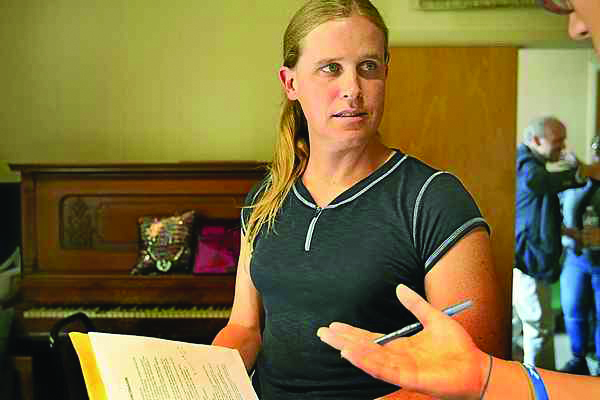By Calvin Men from the Santa Cruz Sentinel
Posted on August 26, 2018
WATSONVILLE >> Eli Wiley can’t stop smiling.
Wiley is a nonbinary 15 year old that goes by the pronoun they. They are about to start a journey to legally change their name and gender.
“I’m very excited. Like really excited. I have wedding jitters,” Wiley said with a giggle.
Wiley was one of about a dozen people who stopped by a workshop held by the Diversity Center on Friday. Called Document Day, the workshop is meant to help transgender people navigate the legal waters of changing their name and gender on federal and state documents.
Old names are generally referred to as dead names by those in the transgender community. The names are their old identities that they never want to hear again, a painful reminder of who they were and what they want to leave behind.
“It just gets awkward and it’s also anxiety inducing,” Wiley said. “It makes it feel invalidating to be called the name you were born with that you don’t identify with.”
The Diversity Center has had a slate of transgender programs presented in the past. But the nonprofit has taken a more focused approach this year with more specific programs that include social events and workshops.
Document Day — known as D-Day at the Diversity Center — is part of the new program. In the transgender community, people often change their names to align with their new identity, according to Ezra Bowen, transgender program coordinator for the Diversity Center. More than a simple change, the new name is a sign of empowerment and progress for many who have struggled to find themselves.
“It’s not just a nickname. It is carving yourself a new identity and asserting yourself in this world as who you want to be perceived as,” Bowen said.
Legally changing one’s name can take several months, with applicants needing to file paperwork at the county level and having to go in front of a judge.
n October, California legislators passed a law allowing people who don’t identify as male or female to obtain a gender-neutral birth certificate. While the law went into effect this year, it has yet to make the process any easier for applicants.
Bowen, a nonbinary person who goes by the pronoun they, knows firsthand the trials of trying to change their name. It took Bowen roughly four months to go through the legal process because of all the paperwork. And when someone throws in trying to legally change their gender or become nonbinary, the formula becomes much more complicated. Some departments require applicants to consult with a doctor before moving forward with the process. Often, people aren’t prepared for the emotional marathon involved.
But Friday’s event was designed to ease the process for people looking to change their names and genders. Workers and volunteers set up tables inside a room at First Christian Church on Madison Street in Watsonville. Six tables were set up in a half circle with signs denoting various legal processes. One table was set up for immigration questions. Another was geared toward minors who want help with nonbinary name and gender changes.
“It’s just good to have someone there to help you out, guide you and navigate these very turbulent legal waters,” Bowen said. “And just to be there as a support.”
One of the first stops at the workshop was a table with the sign adult name and gender change. Alex Katelyn, who didn’t want to use her last name, is a transgender woman who just finished going through sex reassignment surgery.
She held off on going through the legal name changes to make it easier for her insurance company and doctor. She chatted with volunteers about the process and the documents needed. While she did some of the research herself, she said she was grateful for the guidance.
“I came down with a couple of question of what do you put in this box or that box,” she said.
The people that came in varied. Some were adults who had undergone gender reassignment surgery while others were teens accompanied by their parents. Wiley came with their mom and both were at a less when it came to some questions on the forms.
For Wiley, just looking at the forms induced some anxiety because one of the very first questions asked applicants whether they were male or female.
“I want to stop getting misgendered by people who don’t know me. I’m a feminine person and people just assume I’m a female,” Wiley said. “I don’t expect it to ever stop, but if people can look on papers and see this person is not male or female, then it’ll be a real big help.”

